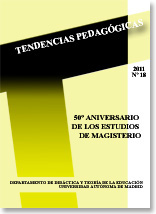Keywords:
Intellectual disability, vocational education, qualitative research, social inclusion, assessment.Copyright (c) 2015 Tendencias Pedagógicas

This work is licensed under a Creative Commons Attribution-NonCommercial 4.0 International License.
Abstract
We present part of the results from the research executed by the Educational and Teacher Training Department of the UAM. The main aim was to evaluate the quality of the vocational education training for intellectual disable students. Information for this research was collected from students, teachers, collaborators and training students. Information treatment was carried out with the computer program atlas.ti. Results have revealed that working insertion for handicap youngsters is possible. Participants in our study understand that working is on one hand a right to people and on the other hand a duty for the society. In order to reach this goal it is necessary to harmoniously combine cooperation among universities, companies and society.Downloads
References
CHARMAZ, K. (2006). Constructing Grounded Theory. Practical Guide Through Qualitative Analysis. London. Sage Publications
COLAS, P. (1998). “El análisis cualitativo de datos”, en BUENDÍA, L. y otros. Métodos de investigación en Psicopedagogía. Madrid, Mc GrauHill
GLASER, B. G. Y STRAUSS, A. L. (1967). The discovery of grounded theory: Strategies of qualitative research. Chicago. Aldine
GONZÁLEZ, F (2007). “Metodología cualitativa y formación intercultural en entornos virtuales” Rev. Electrónica. Teoría de la Educación. Educación y Cultura en la Sociedad de la Información. Pág. 106-133,
www.usal.es/teoriaeducacion
MIGUEL DE, S Y CERRILLO, R. (COORD) (2010). Formación para la inclusión laboral de personas con discapacidad intelectual. Madrid. Pirámide
MILES, M.B. Y HUBERMAN, A. M (1994). Qualitative data analysis. Newbury Park, CA. Sage
MUHR, T. (1997). Atlas.ti- Visual Qualitative data analysis-managementModel Building-Release 4.1. Berlín, short User’s Manual
PÉREZ, G y PÉREZ, M. (2010). “Investigación cualitativa” en Miguel de, S y Cerrillo, Mª R. (coord). Formación para la inclusión laboral de personas con discapacidad intelectual. Madrid. Pirámide
PEREZ, M. (2008). “Inserción laboral de jóvenes con discapacidad. Análisis de las prácticas laborales” en Pedagogía Social. Revista Interuniversitaria, 3ª época, nº 15, pp 99-110
PÉREZ, G. (2011) 5ª ed. Investigación cualitativa. Retos e interrogantes. Madrid. La Muralla.
REVUELTA, F. C. y SANCHEZ, Mª C. (2004). “Programas de análisis cualitativo para la investigación en espacios virtuales de formación” en (http://www.usal.es/~teoriaeducacion/rev.../n 8_01_gonzalez_alonso.pdf) (cons.30-09-09)
STRAUSS, A. Y CORBIN, J (1998). Grounded theory methodology: an overview. En Denzin, N, K. e Lincoln, Y, S. (Eds). Strategies of qualitative inquiry. Thousands Oaks, Sage, p.158-183
TAYLOR, S.J. Y R. BOGDAN. (1986-2004.: Introducción a los métodos cualitativos de investigación, Barcelona. Paidós. España
